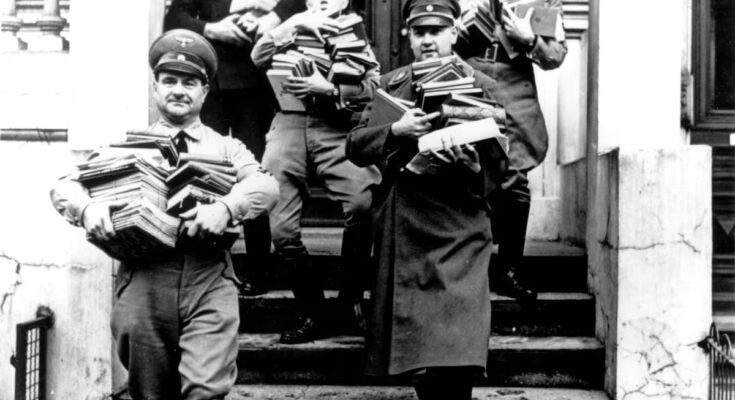In 1941, in the midst of the war, Joseph Goebbels, Reich Minister of Propaganda, promoted a debate between European writers and intellectuals with the idea of defining which literature would be best suited to serving the interests of the “new order” (Neue Ordnung) that Hitler intended to found on the entire continent, even if it were possible. To this end, a group of representatives from several European countries will be convened, most of which are German-dominated: Belgium, Bulgaria, Croatia, Denmark, Finland, France, Holland, Italy, Norway, Romania, Switzerland, Slovakia, Sweden and Spain. The political leaders of the cultural spheres of these countries will not be able to decide the list of their respective participants, which will be thirty in total. As expected, it will not be cridat at the congress, celebrating Weimar in October of that year, Russian writer’s cap or Thursday cap.
The triad of the city of Weimar was appropriate, since it had been the city where two giants of nineteenth-century German literature wrote and became friends: Schiller and Goethe. The aim of the organizers was not to lay the foundations for an “international” literature – an idea not entirely foreign to that of “world”, or “universal” literature, proposed by Goethe at the six talks with Eckermann (Barcelona, Columna, 1994) – but rather a presumed “European literature”, as homogeneous as possible, which knew the Nazi ideology a priori and which achieved widespread diffusion among the “people”. (Nationalisms have always believed that the “people” constituted an indestructible unity. The creation of a sum of different nations was a completely bizarre idea.)
Indeed, Valéry Larbaud expressed himself very differently a few years ago, when he wrote that “the European writer is the one who has a right to the elite of his country and to the elites of other countries. Thomas Hardy, Marcel Proust, Pirandello, etc., are European writers. Authors who are popular in their countries of origin, but are not legitimate for the corresponding elites; they are, let’s say, national writers.” The Nazis’ intention was precisely to displace this cosmopolitan idea and to stimulate a literature for the continent based on the assumptions of their country’s national romantic literature: eventually, the Third Reich would be filled with the theories of Fichte and Herder, and here with the German cultural arrival of the 19th century – which, for the purposes of romanticism, included the medieval arrival proper; vegeu the case of Wagner—, in which the “nostrat”, “mythological”, “patriotic” and, with a certain frequency, “folkloric” element predominates and of poor universal quality.
Since it was very clear that Germany wanted its own criteria to prevail and the country was completely in the hands of the military and ideological power of Nazism, it is not strange that, in the end, this congress opened up to the challenge of writers and intellectuals: for Catalonia there will be none, it is clear; In Spain there will be Ernesto Giménez Caballero, a Francoist who believed Hitler was married to Pilar Primo de Rivera; for France, Drieu la Rochelle and Robert Brasillach – after the war, the former committed suicide to kill a judge and the latter was killed by a collaborator –; for Italy, Arturo Farinelli or Giovanni Papini; in Germany, Hans Carossa – whom Thomas Mann called “a poor man” in the six radio broadcasts of 1940-1942 – and in Norway, Knut Hamsun, Nobel Prize winner and former sympathizer of Nazi ideology.
The Nazis didn’t just want to shift sides of the Franco-German divide into place; I also wanted to revive the idea that the best literary culture in Europe came from the shores of the Mediterranean (Greece-Rome-Carlemania-Humanism), and replace it with a more inverse idea, which was Germanic mythology, Nordic civilizations and cultures (Hamsun hi ajudava) and, more than covering something else, the idea of a literature in the service of racial purity and of a rare epic now patriotic and transnational.
The Italians are not willing to give up on this land, but the Nordics will remain faithful to the environment of Goebbels’ goals. A second edition of the congress will be convened in 1942: Mateix Mann will say that there are «all the mena de collaborators “and the literary mercenaries of collaboration” – and the vicissitudes of the war will determine that they will not capitulate. Goebbels, determined not to agree with all Europeans on literary matters, will come to the conclusion that, if he wanted to pursue his goal, he could not have done anything other than use brute force, which was the element in which the Nazis moved most willingly. They will lose the war and they will all remain in Germany, where they will lose the war in the literary field three years later than in the military one.



